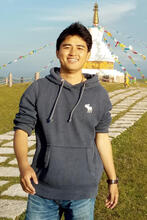Into the Midwest: Tibetans, Chinese, and Muslims in China’s Incorporation of Inner Asia, 1862–1962
Gyatso Marnyi - Postdoctoral Associate in East Asian Studies and Lecturer in Religious Studies
From 1862 onward, frequent wars and natural catastrophes caused millions of deaths across midwestern China. Within a century, several hundred thousand Chinese and Muslims fled to Amdo on the northeastern Tibetan Plateau. At the same time, the Qing, Republican, and Communist governments strove to counter foreign encroachments on Inner Asia. How did these refugees cross the Sino-Tibetan border and establish their communities in Tibetan territories? What were the dynamics of interaction between these ethno-culturally diverse groups as Amdo was transformed into Chinese territorial administrative units of Gansu, Qinghai, and Sichuan? How did local Tibetan clans (tsho ba) sustain themselves while traditional socio-economic and religious-political structures collapsed? Based on both ethnographic and archival research, this talk explores China’s turbulent transition from the Qing Empire to a “unitary multinational state” through the experiences of residents in the Midwest. It unpacks China’s nation-state building within the historical context of frontier-making in Inner Asia, telling a story of the displacement of Chinese, the segregation of Muslims, and the dispossession of Tibetans.
Gyatso Marnyi is a historian of empires and frontiers in East Asia. Combining textual sources with ethnographic fieldwork, his research focuses on the interaction and exchange between China and Inner Asia from the fourteenth to the twentieth century. He is currently working on a book project that examines the dispossession of Tibetans, the displacement of Chinese, and the segregation of Muslims along with China’s transition from empire to nation-state in the Northwest between 1862 and 1962. He is also editing a book that explores how different ethnic groups along the rivers of the eastern Tibetan Plateau have adapted to, negotiated with, transformed, and interpreted their natural surroundings.
Gyatso received his PhD in Chinese Studies from the Chinese University of Hong Kong (2020). He holds an MA in Buddhist Studies from Hong Kong University (2014), and a BA in Chinese Classical Philology from Nanjing Normal University (2012). Before coming to Yale, Gyatso was appointed as Postdoctoral Research Scholar in Modern Tibetan Studies at Columbia University.

